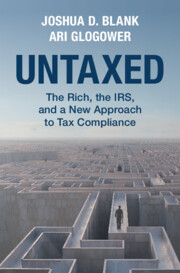Refine search
Actions for selected content:
14 results
3 - Taxing Nomads
- from Part I - People and States
-
-
- Book:
- Taxing People
- Published online:
- 18 December 2025
- Print publication:
- 22 January 2026, pp 42-57
-
- Chapter
- Export citation
Enhancing taxpayer registration with inter-institutional data sharing—evidence from Uganda
-
- Journal:
- Data & Policy / Volume 7 / 2025
- Published online by Cambridge University Press:
- 28 November 2025, e81
-
- Article
-
- You have access
- Open access
- HTML
- Export citation
Charismatic State Building: The Reform of SUNAT in the Early 1990s
-
- Journal:
- Latin American Research Review ,
- Published online by Cambridge University Press:
- 04 July 2025, pp. 1-19
-
- Article
-
- You have access
- Open access
- HTML
- Export citation
The Evolution of the Irish 12.5 Percent Corporate Tax Rate: An Oral History
-
- Journal:
- Enterprise & Society , First View
- Published online by Cambridge University Press:
- 17 February 2025, pp. 1-25
-
- Article
-
- You have access
- Open access
- HTML
- Export citation
7 - Mottos for a More Tax-Compliant Society: Strategies, Tax Compliance Research, and Fiscal Practices at the Swedish Tax Agency
-
-
- Book:
- Anthropology and Tax
- Published online:
- 12 December 2024
- Print publication:
- 19 December 2024, pp 178-199
-
- Chapter
-
- You have access
- Open access
- HTML
- Export citation
Conclusion
-
- Book:
- Untaxed
- Published online:
- 22 November 2024
- Print publication:
- 28 November 2024, pp 239-242
-
- Chapter
- Export citation
Introduction
-
- Book:
- Untaxed
- Published online:
- 22 November 2024
- Print publication:
- 28 November 2024, pp 1-12
-
- Chapter
- Export citation
1 - Tax Noncompliance at the Top
-
- Book:
- Untaxed
- Published online:
- 22 November 2024
- Print publication:
- 28 November 2024, pp 13-37
-
- Chapter
- Export citation
2 - How the Tax System Addresses Noncompliance
-
- Book:
- Untaxed
- Published online:
- 22 November 2024
- Print publication:
- 28 November 2024, pp 38-63
-
- Chapter
- Export citation
3 - Means-Adjusted Tax Compliance
-
- Book:
- Untaxed
- Published online:
- 22 November 2024
- Print publication:
- 28 November 2024, pp 64-100
-
- Chapter
- Export citation

Untaxed
- The Rich, the IRS, and a New Approach to Tax Compliance
-
- Published online:
- 22 November 2024
- Print publication:
- 28 November 2024
ARTIFICIAL INTELLIGENCE, THE RULE OF LAW AND PUBLIC ADMINISTRATION: THE CASE OF TAXATION
-
- Journal:
- The Cambridge Law Journal / Volume 83 / Issue 3 / November 2024
- Published online by Cambridge University Press:
- 23 September 2024, pp. 437-464
- Print publication:
- November 2024
-
- Article
-
- You have access
- Open access
- HTML
- Export citation
6 - The Tax Effort
- from Part II - A Deeper Investigation of Some Key Sectors and Institutions
-
-
- Book:
- State Capture and Rent-Seeking in Benin
- Published online:
- 09 November 2023
- Print publication:
- 23 November 2023, pp 212-241
-
- Chapter
-
- You have access
- Open access
- HTML
- Export citation
Introduction
-
- Book:
- The Administrative Foundations of the Chinese Fiscal State
- Published online:
- 24 March 2022
- Print publication:
- 31 March 2022, pp 1-25
-
- Chapter
- Export citation
